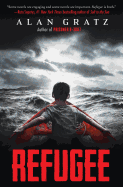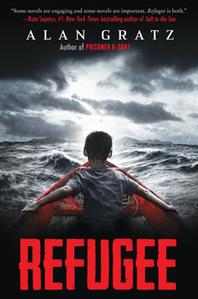
 Conversations about refugees are often heated, focused on hypotheticals and unknowns. By making visible three young emigrants--rather than those who fear them--Refugee aims to provide a corrective to this American myopia. Josef, 12, is escaping Germany in 1938; after his father is released from Dachau, his Jewish family scrambles aboard the ill-fated German liner St. Louis. Isabel, 11, is escaping Cuba in 1994, leaving in a handmade boat for a better life, one that includes more opportunities for her future as well as keeping her activist father out of Castro's prisons. And Mahmoud, 12, leaves Aleppo in 2015 with his family in a panic after their apartment building is bombed. Moving briskly among Josef, Isabel and Mahmoud, each short chapter brings new tragedy, occasional hope and continued instability to all three children. Their journeys echo each other deliberately; for example, after Josef's father is arrested during Kristallnacht, Isabel hears broken glass on the Malecón before a riot a few chapters later. Oceans and seas become universal nemeses as Josef's ship sits at anchor, Isabel's boat begins to disintegrate and Mahmoud's family waits desperately for a boat to Greece. Promises of tomorrow and mañana appear and reappear in each chapter, reflecting the apathy of host nations across the decades. The book ends with a satisfying connection between the refugees, but also introduces the journey of a lifetime: adjusting to life in a new home.
Conversations about refugees are often heated, focused on hypotheticals and unknowns. By making visible three young emigrants--rather than those who fear them--Refugee aims to provide a corrective to this American myopia. Josef, 12, is escaping Germany in 1938; after his father is released from Dachau, his Jewish family scrambles aboard the ill-fated German liner St. Louis. Isabel, 11, is escaping Cuba in 1994, leaving in a handmade boat for a better life, one that includes more opportunities for her future as well as keeping her activist father out of Castro's prisons. And Mahmoud, 12, leaves Aleppo in 2015 with his family in a panic after their apartment building is bombed. Moving briskly among Josef, Isabel and Mahmoud, each short chapter brings new tragedy, occasional hope and continued instability to all three children. Their journeys echo each other deliberately; for example, after Josef's father is arrested during Kristallnacht, Isabel hears broken glass on the Malecón before a riot a few chapters later. Oceans and seas become universal nemeses as Josef's ship sits at anchor, Isabel's boat begins to disintegrate and Mahmoud's family waits desperately for a boat to Greece. Promises of tomorrow and mañana appear and reappear in each chapter, reflecting the apathy of host nations across the decades. The book ends with a satisfying connection between the refugees, but also introduces the journey of a lifetime: adjusting to life in a new home.
Alan Gratz (Code of Honor; Projekt 1065; The League of Seven), whose Prisoner B-3087 has become a staple of school reading lists, uses his trademark straightforward prose to illuminate the danger facing refugee families. Insightful details help contemporary readers to connect with the story, especially in Mahmoud's chapters, in which smartphones play an important role ("Google Maps told them it would be an eight-hour walk, and they split the journey up by sleeping in a field"). Gratz focuses on individual villains and heroes, rather than structural causes of refugee crises, but nevertheless young readers will finish this book and ask: What should we do? Adults will be similarly struck by the words of Isabel's grandfather: "[A] funny thing happened while I was waiting for the world to change, Chabela: It didn't. Because I didn't change it." Accordingly, in his author's note at the end of the book, Gratz shares not only more details about the past, but also welcome suggestions from those who want to change the future. --Stephanie Anderson, assistant director for public services, Darien Library (Conn.)
Shelf Talker: Action-filled short chapters provide painstaking portraits of three young refugees from Nazi Germany, Castro's Cuba and contemporary Syria in Alan Gratz's middle-grade novel.

